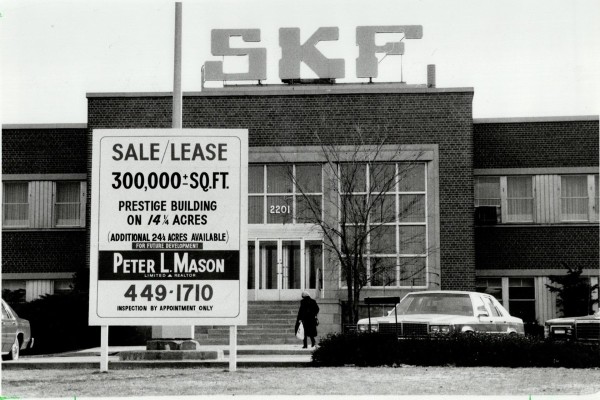Young workers: An “entitled” generation without entitlements

Photo by Fred Chartrand/CP
Every generation seems to think that those who come after are broken in some way: that they are disrespectful, lazy or aimless. But such comments on young Canadians todays are taking place in the context of a notable societal shift, where many expect lower standards of living than their parents and many are missing out on key economic rites of passage, along with hitherto stable systems of employment and social security. This is all while older Canadians in positions of power rail against the supposed decadence of Millennials. In other words, we brand this generation as entitled, even as they are left with little of the entitlements many Canadians have enjoyed since the Second World War.
The reason young people have been so denigrated, specifically in regards to the workplace, is because current patterns of intergenerational inequality are showcasing key flaws in late-stage capitalism, where record profitability is accompanied by a degradation of wages, labour standards, job security and social spending. Now more than ever, we have the material wealth to virtually end poverty, unemployment and social injustice, and yet consistently choose to intensify inequality within and between generations. Ultimately, the branding of millennials as lazy and entitled is essential to justify the intensified destruction of the postwar social contract.
Because if young people aren’t lazy, selfish and shallow, people just might begin to question the social injustice levied against them. Already today, young people are increasingly skeptical about capitalism, and even though they have not broadly accepted socialism, they are far less likely to reflexively reject it as an option. It is therefore unsurprising that the struggles of millennials are cast as a supposed defect in, or unrealistic expectations from, the “participation trophy” generation.
The guilt for this rests largely with capitalists and right-leaning governments, including our supposedly progressive federal Liberal government. I have already explored for Canadian Dimension how Trudeau ran on optimistic rhetoric for young Canadians, but his policies and messaging since then have emphasized a need for young workers to accept increased precarity. And since Finance Minister Bill Morneau’s “job churn” comments, the government has introduced Bill C-27, which is an attack on defined benefits pensions that will make it exceptionally difficult for young people to obtain a secure retirement plan. In essence, the government sees a precarious generation of workers on the horizon, and offers little but pessimism and weakened protections now that they’ve gotten their votes.
Expectations, what expectations?
Employers aren’t any less responsible, because Canadian companies are sitting on billions of uninvested dollars. So while there are currently the funds to hire eager young workers, the political discourse is predicated on painting young people entering the workforce as being unreasonable in demanding corner offices and high wages right off the start.
The reality is something quite different. Most young people don’t expect six-figure salaries out the gate, but are rather concerned about how universities are increasingly used to replace on-the-job training, how unpaid labour is seen as the entry point into some job markets, and how educational costs are skyrocketing even as the value of that education becomes all the more speculative, not because of its quality, but because employers fail to effectively train and mentor classically-educated young people as they had been doing for generations. Like our current government, employers sell the dream of a prosperous life to young Canadians if they work hard, but when push comes to shove, they pillory them and treat their qualifications as without value.
That employers and historically anti-labour Liberal governments are attacking young workers is perhaps not that surprising, but even among the Left we fail to reckon with these issues in any sort of comprehensive fashion. While some unions have made fantastic efforts to defend pensions and benefits for future members, others have rather quickly adopted two-tier models that explicitly codify a program of unequal pay for equal work. The latter do no favours to the next generation, nor to the wider movement, because they are assisting employers and the state in lowering the expectations of not just of a bargaining unit, but of the future workforce.
And while the Ontario NDP has proposed reforms to lower the burden of student debt, and federal MP Niki Ashton has passionately championed the plight of a precarious generation, the party as a whole has to do more to include young voices. A few weekends ago, I attended the ONDP’s provincial council meeting, and noted a lack of young faces and voices. At one point, speakers got up to attack new Ontario Progressive Conservative MPP Sam Oosterhoff more for his gall to run for office at 19 than for his homophobic views. One brave sister stood up to challenge this viewpoint, articulating how it implied a derision for young leadership, and how it heightened the need for young leadership in Ontario’s social democratic movement.
And it is because of some of these actions — including young workers vocally critiquing the Trudeau regime’s failures — that I am hopeful. Young people have traditional allies within labour and the NDP, and those forces can still do great things for the next generation, which is not just the future, but the right now.
But because these movements have at times failed to represent young workers, cynical Liberal governments have been allowed to capture the change mandate, giving rise to movements that attach young-worker issues to a fiscally conservative ideology. Young people, within institutions and social movements have to be given (but also take, if necessary) the space to lead.
Christo Aivalis, a member of the CD web committee, is an adjunct professor of history at Queen’s University. His dissertation examined Pierre Trudeau’s relationship with organized labour and the CCF-NDP, and has been accepted for publication with UBC Press. His work has appeared in the Canadian Historical Review, Labour/le Travail, Our Times Magazine, Ricochet and Rankandfile.ca. He has also served as a contributor to the Canadian Press, Toronto Star, CTV and CBC. His current project is a biography of Canadian labour leader A.R. Mosher.










